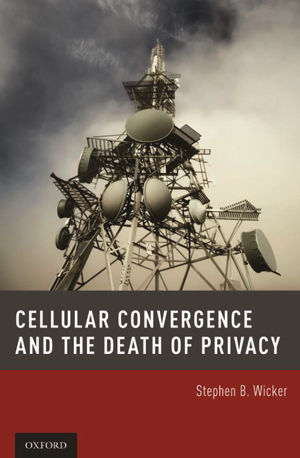Your phone can spy on you, new book warns
By Bill Steele

You have a window to the world in your pocket. Your smartphone can answer your questions, tell you where you are and how to get where you’re going, help you spend your money. … Oh, and once in a while it will even make a phone call.
The catch is that the world can look back through that window at you.
That – and what we might do about it – is the message of “Cellular Convergence and the Death of Privacy” (Oxford University Press, 2013) by Stephen Wicker, professor of electrical and computer engineering.
The book was written before the current eruption of criticism over spying by the National Security Agency (NSA) but, Wicker said, “The NSA has simply been caught taking advantage of the vulnerabilities that I discuss in the book. [The publicity] gives us a chance to have an open democratic debate about the surveillance.”
The term “cellular convergence” refers to the fact that more and more of our activities are being managed through that little flat box. That’s “wonderful,” Wicker said, “but we must be aware that cellular is also a surveillance technology.”
Surveillance is a fundamental part of the network, he explains in the book. To route incoming calls to the handset, the phone company keeps track of the cell towers that are nearby. Location-based apps keep even more refined data, constantly triangulating from cell towers and reading GPS location information. To monitor performance it logs that data, and thanks to recent court decisions it can make the logs available to law enforcement without a warrant. Service providers might also sell the data to commercial enterprises to use in targeting advertisements, and not just the ones that invite you to a restaurant nearby. Knowing where you go, down to the level of street addresses, can reveal a lot: your job, your religion, food preferences, what kind of car you drive, where your kids go to school and which medical specialists you visit, to name just a few possibilities. The lack of concern over “metadata,” Wicker said, ignores the vast amount of information context can reveal.
In one notorious case, hidden software on millions of phones logged text messages, Google searches and phone numbers dialed. “The amount of data that is being collected is astonishing and problematic,” Wicker writes. “Were the data simply thrown away after being used to route calls or improve network performance, I would not be writing this book.”
After explaining the technology, Wicker reviews the tangled history of communications law and politics, from the wiretapping of early telegraph lines to the Patriot Act passed after the Sept. 11 attacks, which required communications providers to collect and store an array of information and make it available to the government. Along with eroding privacy, he adds, government action or inaction has seriously slowed the progress of cellular communications.
He draws on philosophers and psychologists to argue that privacy is a “right,” because it is essential to the development of personality. And while mobile phones have vastly expanded the potential for personal expression, he points out, the ever-present possibility of surveillance can have a chilling effect.
Finally, he proposes two ways to limit electronic intrusion: First, encryption of the data we send over the system. Second, “Simply starting from scratch” by redesigning the system: make location data less precise and let the handset make decisions about where and how messages are routed, similar to the way messages are sent “end to end” on the Internet. Phones could also use increasingly ubiquitous Wi-Fi to bypass cell towers altogether.
“It is time to remove the impediments and let cellular technology achieve its full promise,” Wicker concludes.
Media Contact
Get Cornell news delivered right to your inbox.
Subscribe